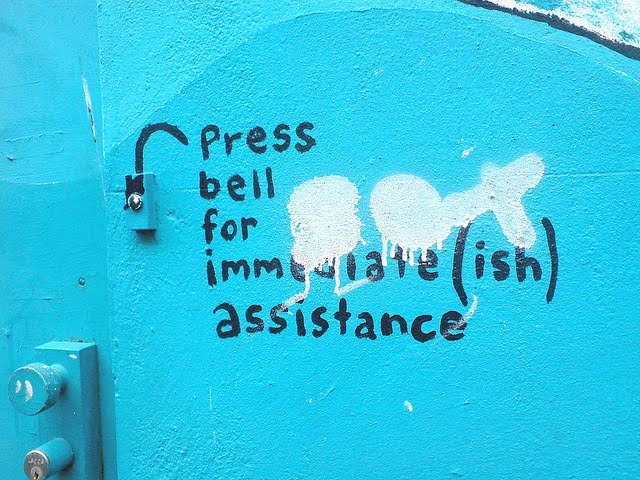Posts Tagged ‘business’
 3
3
Why You Should Start a Business During Down Times
On a recent flight, I sat next to a man who had just started a new business. Unless you’re in Brazil, India, or China, starting a business anywhere else in the world at this moment is a difficult proposition. The recession has not subsided and economic indicators are all over the place. My new friend, Mike, is creating incentive management software for auto sellers. Nissan is his first client. What a way to get started by landing a big fish…no, landing a whale. But then I thought about when I started my own business and decided that this is a perfect time to start a new venture. I started The A Group ten years ago this past November, a couple of months after 9/11. I have learned big shifts in the economy, such as our current recession, create openings in opportunity because it often changes the rules of the game.…
 4
4
Successful Surveys in a Time of Consumer Fatigue
The proliferation of customer satisfaction surveys is taking its toll on me. Once I was inclined to answer them. Now, I immediately dismiss the many requests for my feedback. According to an article in the NY Times, the exponential growth of the satisfaction survey is annoying consumers world wide. In the past, these surveys were an expensive proposition. Market research firms charged a lot of money to define, craft, and administer polls and to find a good representative sample of the target group. There is a lot of science and experience that goes into good quantitative and qualitative research. But with the advent of easy-to-use survey tools like SurveyMonkey, anyone can create a quick one and throw it online. What once was viewed as a privilege is now seen as a nuisance. So should you give up on getting feedback from the stakeholders in your organization? Of course not; but…
 7
7
Managing Expectations: The Importance of the Weakest Link
Managing expectations is critical in every organization. But it is especially important in the service-oriented businesses where one’s last experience can ruin years of a strong reputation. I was just reminded of how important that is during dinner out last night. Sometimes it is not the big things that can ruin an experience, but a careless decision that puts your entire team at a loss. I met with some co-workers and a client at one of Nashville’s most celebrated restaurants. My out-of-town guest is a foodie. He has eaten his way through Europe as well as some of the best restaurants in the US. I was hoping to make a good impression of Nashville and what we had to offer. He and I were immediately drawn to one of the chef’s signature dishes: the miso crusted sea bass. We were promptly told that even though the menu said sea bass,…
 30
30
How to Create a Winning Logo
A logo is a visual representation of an entity, may it be a business, a church, an organization or an individual (remember when Prince dropped his name and wanted to be know by his logo?). My company, The A Group, has created hundreds of logos over the past several years. The process has been as simple or as complicated as each client, but at the end all good logos ultimately share the same DNA. 1. It can be reproduced in one solid color. If your logo needs two or four colors to look good or it needs that nifty 3D effect to look ok, it’s not a successful logo. If it works in solid black then it will work in any color or rendering. 2. It’s simple. I cannot tell you how many times I have run into logos that tried to “tell a story.” Like verbosity, these overly symbolic…
 12
12
How to Hire Well: The Owner Principle
I have always been an owner even when I worked for someone else. Recently I have thought about my employment history as well as those who have been my colleges and employees over the years and have come to the conclusion people fall in two main categories: owners and workers. Before you dismiss the post, let me explain. This is not a legal distinction, but a psychological one. Interestingly, some business owners behave like managers or workers doing what’s required of them and completely disconnecting from their jobs once the clock hits 5 p.m. Some hirelings whose heart and passion for their performance cause them operate more like owners. The more owners you have in your organization, the more successful you’ll be, I’m convinced. Here’s a list of owner characteristics: Owners care about the entire team and not just themselves. They know that no one is successful alone. Owners understand…
 7
7
Why Your Organization’s First Impression Matters
First impressions matter, whether you like it or not. They matter not only on a personal level but also on a business and even more so when it comes to a church. Our first impression of a business, store or venue sets our expectations for the type of product or experience we perceive we are about to get. The implications of your first impression are huge. Starting at a deficit. If you don’t “present well” someone’s first encounter with your organization, then you will automatically go into a “deficit” standing. Starting here means you have to work harder to overcome the initial perception of your product, whether it be consumer goods, services or an experience. Basically you’re saying, “we’re better than what you think we are” and then you’ll need to spend time and equity to get your audience to see in a better light. Unfortunately, you often do not…
 8
8
Are you Adapting to the Change Accelerators?
Change is inevitable. Everything and everyone we know is a constant state of flux. As much as we seek stability in the comfort of a routine, we soon have to come to the realization that the world around us is changing at an increasingly rapid pace. There are three accelerators that drive most of change today. Here’s how people, technology and information are accelerating change. People The world population is currently estimated to be 6.915128 billion by the United States Census Bureau.[1] The world population has experienced continuous growth since the end of the Bubonic Plague around the years 1348-1350.[2] Current projections show a continued increase of population with the population expected to reach between 7.5 and 10.5 billion in the next decade. Technology Radio 38 years to reach 50M TV 13 years to reach 50M Internet 4 years to reach 50M Facebook – 9 months to reach 100M Information…
 13
13
Are You Asking the Important Questions?
Back in 1988 Eastman Kodak had a surplus of 1.4 billion dollars the equivalent of nearly 2.5 billion in today’s dollars and 11 profitable business units. This year Kodak is set to lose between 400 and 600 million dollars, its 12 losing quarter in the past 15 quarters according to an article on USA Today. The digital revolution has hit the once-global giant hard. Its stock peak at nearly $100 a share and now is considered junk, worth less than a dollar per share. Interestingly, Kodak researches invented the digital camera. According to the article, the film business was just too lucrative to do shift gears into the digital opportunity with its much smaller margins. It didn’t happen overnight but the day Eastman Kodak decided to ignore the trend it help to start for the sake of their most profitable product, it was the day the company began to die.…
 5
5
You Cannot Tweak Your Way into Effectiveness
I have been guilty of trying to tweak something that needed a major overhaul. After a lot of effort and resources making minor adjustments here and there, I usually end up with slightly more effective and yet still unsatisfactory results. Yes there might be some change, even some forward progress, but not enough to make a difference. I don’t know your circumstances, but I’m almost certain that there’s an area of your life, your business, or ministry that is in desperate need of a complete overhaul right now and all you are doing are minor tweaks. I understand the fear of the disruption a bold course of action might cause. I get the fact that the consequences of a difficult move might be more than you have bargain for. They usually are. I also know that when we fail to do the difficult thing, we fail, period. If I have…
 12
12
The Business Generosity Principle
“Why are you being so generous with a total stranger?” asked the young entrepreneur sitting next to me on a recent flight. Once he found out I owned a similar business, his questions became very strategic and somewhat personal. After spending the best part of two hours giving him an “MBA” crash course, as the business man on the other side labeled our exchange, I gave him my information in case he had more questions. He was bewildered with my apparent generosity in sharing some of my businesses practices and lessons. The big question was still looming: why would I share business practices with a potential competitor? My response was simple but not simplistic. In all my years, I always receive more in return than I give away. It doesn’t mean I’m ready to give valuable consulting for free or undercharge for my company’s services. But every time I have…
